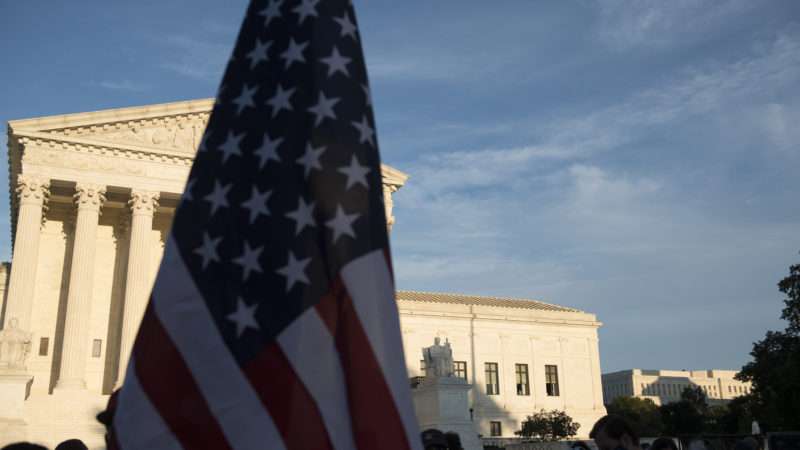Joan Biskupic has published a lengthy profile of her twenty-year relationship with Justice Ginsburg. It is titled, “20 years of closed-door conversations with Ruth Bader Ginsburg.” Much of the material appears in Joan’s excellent books and articles. But there were a few bits I don’t remember seeing before. I will highlight them here.
First, Joan last met with RBG in January 2020:
In my last one-on-one session in her chambers, in January 2020 as a fire crackled, she had more pressing health concerns on her mind: “I’m cancer free. That’s good.” A year earlier she had undergone lung cancer surgery and, a few months after that, had endured a second pancreatic cancer scare.
Does this statement mean Biskupic and Ginsburg were out of touch after January? Most of Joan’s post-Term reporting concern events that happened after January. Most, but not all. And there may have been sessions that were not in chambers–especially after COVID shut down the Court. We’ll see next year if Biskupic continues to publish leaks, even without RBG.
Second, Joan addresses a common complaint: RBG used the press to speak to her colleagues.
On occasion, readers questioned whether Ginsburg was trying to send a message to the other justices through me. I brushed off that suggestion. Ginsburg was able to speak her mind and skilled at persuasion. And she never knew for certain when anything she told me would be published.
I’m not so sure about the last part. Media savvy people know what the money quote will be. When I speak to a reporter, I can usually get a feel for what will, and will not be published. Ginsburg’s “faker” line, for example, was bound for the front pages.
Third, Biskupic offers these remarks about Kagan. I don’t recall seeing these precise phrasings before:
She also enjoyed watching Kagan spar rhetorically with Chief Justice John Roberts in the behind-the-scenes drafting process. Kagan “is just a delight,” Ginsburg told me, “and very solid on substance.”
Over the years, I noticed RBG praised Justice Kagan fairly often. But I can’t recall seeing frequent praise of Justice Sotomayor. In big cases, Kagan would be assigned the dissent, and not Sotomayor. I’m sure this sleight was noticed.
Fourth, we learn that Justice Ginsburg broke her ribs a second time in 2013. (She broke them the year before, during the ACA deliberations):
The physical resilience of Ginsburg, then 79, continued to amaze me. When I went to see her at the close of the next year’s session, in 2013, I offhandedly asked whether she had again fallen. I did not expect the answer I received.
“Yes, I fell,” she said. “It was almost identical” to what had happened a year earlier. “I knew immediately what it was this time. They wanted to send me to … the emergency room, and I said, no, absolutely not. … There’s nothing you could do. You just live on painkillers for awhile.”
I don’t believe this injury was disclosed to the public. In 2012, she also delayed in telling the public about her broken ribs.
Fifth, Joan recounts an episode when President Obama invited RBG to lunch in 2014. Was he trying to nudge her to retire?
In 2014, I received a tip that Obama had privately invited Ginsburg to lunch a few months earlier. I could not help but wonder whether Obama was exploring the possibility that she might soon retire. I asked the justice how their time together had gone….
Ginsburg rejected my questions about whether he might have been fishing for any sign, as they dined alone, of her retirement plans.
“I don’t think he was fishing,” she said.
When I asked why she thought he had invited her, she said, “Maybe to talk about the court. Maybe because he likes me. I like him.”
In November 2014, the Democrats would lose the Senate. Perhaps this was a move in advance of that election, such that Ginsburg’s replacement could have been picked over the Summer of 2014. At the time, the Democrats had a slim, 53 seat majority.
Biskupic does relay a delightful anecdote:
“They’ve got a very good chef at the White House,” Ginsburg began. “The problem for me is the President eats very fast. And I eat very slowly. I barely finished my first course when they brought the second. Then the President was done, and I realized that he had important things to do with his time.”
Nina Totenberg told a similar story in her profile:
Ruth loved food. She may have been 85 pounds soaking wet toward the end of her life, but she loved to eat. Slowly, very slowly. But God help you if you tried to take her plate way before she had eaten every last morsel of food on the plate.
Sixth, Biskupic relays some heart-felt comments from the wake of Justice Scalia’s passing.
“My first reaction was I was supposed to go first,” Ginsburg later told me. “I’m three years older. My second thought was, well, we all have to go sometimes.”
Referring to Scalia’s apparently dying in his sleep, she said, “It’s the best you can do.”
Apparently? Come on. Are we back to the Pillow Theory?
Seventh, RBG recounts a defeat from a 2011 CivPro case:
I told her that Scalia had once described her as “a tigress on civil procedure.”
“She has done more to shape the law in this field than any other justice on this court,” he had told me. “She will take a lawyer who is making a ridiculous argument and just shake him like a dog with a bone.”
“I wish he had listened to me more often,” Ginsburg responded during our January conversation.
She shuddered as she recounted a 2011 case in which, she said, Scalia and other conservatives had “picked up” enough votes to deprive her of a majority on a civil procedure issue. Before that case, she told me, “I was really on a roll.”
I scanned through the cases from OT 2010. My guess is J. McIntyre Machinery, Ltd. v. Nicastro. The court divided, sharply, about whether a consumer could sue a foreign manufacturer in state court over a product sold in the United States. Justice Kennedy wrote the plurality. Justice Ginsburg dissented, joined by Justices Sotomayor and Kagan.
from Latest – Reason.com https://ift.tt/35WuWem
via IFTTT


